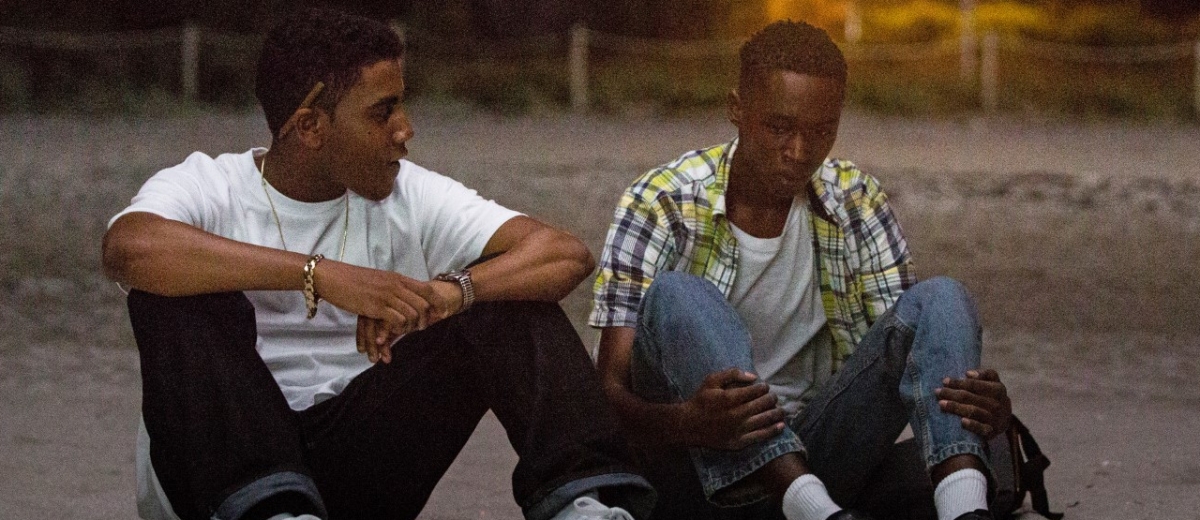Moonlight (2016, dir. Barry Jenkins) examines the never spoken Black sexuality and masculinity through a lens of a boy, teen, then man who is hardened by what his environment demands of him. It’s a journey of how Chiron silently slips into manhood with his emotional insights beaten down but intact. He rarely speaks but it’s what he experiences and observes that speak volumes and tell his narrative.
This coming of age story is broken up into three distinctive chapters, or acts, of Chiron’s life. First, as an elementary school boy who is fleeing the kids who bully him. Second, as a quiet and lonely teenager in high school. Lastly, as a grown man who seems devoid of emotion.
Perhaps it’s the quietness and the stillness of Moonlight that makes it so beautiful. The lack of dialogue speaks louder than the conversations and words themselves on the rough streets of Miami.
The most important scene for me was during the first chapter, when he asks Juan, a father figure who also happens to be Chiron’s mother’s drug dealer, “What is a faggot?” The juxtaposition of Chiron seeing Juan as a father figure and asking him these coming of age questions with the fact that Chiron’s mother is addicted and dependant on Juan’s drugs shows the dichotomy of what Chiron doesn’t understand. The man he finds shelter with is also the man who sells his mother drugs. Juan then realizes that it is the very drugs he sells himself that has destroyed Chiron’s childhood.
Chiron in the second chapter is a teenager in high school, more lonely than ever before. He is seen completely isolated and in survival mode. His tough childhood, devoid of much compassion or parental care, leaves him hardened and exhausted.
The last scene of his teenage years is as Chiron gets arrested and he looks back longingly at Kevin, a childhood friend-turned-lover. This scene cut me to the core as I witnessed a good kid taking the short end of the stick as life screws him over. The scene where Chiron walks to the police car in slow-motion is the epitome of the American misunderstanding of the Black struggle for survival. This is a good kid but because of the environment and situation he was placed in, none of which was through his own choosing, he was heading to prison and waking up to being a drug dealer in the third chapter. This is the Black narrative in America, a never-ending cycle of violence and low expectations of Black men.

Kevin (Jharrel Jerome) and Chiron (Ashton Sanders) in the second act of Chiron’s life.
In the third act, Kevin and Chiron meet up again as grown men and the two sit at the diner Kevin works at, exchanging few words and more wine at a diner in Miami. It was what Chiron and Kevin didn’t say that created the chemistry between the two characters, as they remember where they came from, where they’ve been, and where they are now. It’s the silent Blackness and queerness that made this scene the most heartwarming in the entire film. The traditionally tacit nature of Black sexuality was spoken through the way the men looked at each other from across the diner booth. Without words, Chiron and Kevin manage to speak volumes in their desire and yearning for a human connection and find comfort in each other’s loneliness.
It was this silence and despair reflected in such a human way that struck me the most. The emotions evoked in me felt so personal and most importantly, felt so real. We can easily be surrounded by a sea of people, like Chiron, but to feel misunderstood and invisible when all you seek for is a human connection is an universal experience that many go through. Because of the social implications and shaming of what it means to seek this type of connection, as a society we’ve developed an inability to seek for help when we lack and yearn for companionship.
Chiron just wanted to know that there was someone out there that gave a shit about him and what happened to him. I think for most of us, that’s what we want too. To have that knowledge, that someone cares is one of the greatest privileges humanity can give back to us individually. Jenkins beautifully depicts on screen, what it means to be black, queer, poor, and lonely in America. This intersectional narrative all too often does not receive the visibility it deserves. Chiron’s life experience needs to be shared with the world.
Moonlight is by far one of 2016’s best films. It is hauntingly silent yet consequently manages to break down the wall and usual guardedness of black sensuality and queerness in the African American community. In the same vein the film is strikingly simple: it is about a kid who, without any help, survived and took decades to find who he is, and his journeyed to finding a connection in order to escape his loneliness. Everyone can relate to that, queer, Black, or not. Everybody can.

